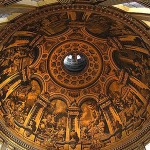Supper with Abba
by Philip Adam
For 20 years I refused to partake of the bread and wine in part because of something my Dad, a Lutheran pastor, wrote to me almost 30 years ago when I was in college. “You need to realize your own worthlessness so you can truly and humbly accept Christ’s forgiveness.” Dad was only trying to convince me to return to the church. He never would have asked me to believe something he did not believe with his whole heart. Yet I read that and the scales fell from my eyes. I said to myself, “This is truly the actual creed by which I try to live my life. This is not healthy.” I had not been able to articulate why I did not like the church, and then Dad summarized it for me in a single sentence. I had no intention of ever participating in a church ever again.
When consecrating the bread and wine, Pastors usually say, “Do this in remembrance of me for the forgiveness of your sin.” And I would associate it with the phrase “realize your own worthlessness.” In the Middle East, sharing a meal literally means, “Total acceptance.” But communion clearly meant the opposite to me. It reminded me of the image of the God I grew up with; an angry, authoritarian, patriarchal God who needed his wrath satisfied with Jesus’ death. Although it took a while, I would eventually and confidently conclude Jesus, the perfect embodiment of masculine spiritual energy and feminine spirituality, also rejected authoritarian patriarchy in all its forms and called God, “Abba”. “Abba” is the Aramaic word for “Papa” or “Daddy”. Only after I came to that conclusion could I partake of the bread and the wine.
In 1986 I stumbled upon a magazine, read an article, and got a subscription. Many of the articles were written by people describing their feelings of worthlessness and how they had the discovered the Christ of the Gospels that affirmed their sacredness. I didn’t understand the sexuality aspect very much, but many of the articles were written by gay Christians. I hardly know any gay Christians, yet they are a significant aspect of my faith story. These writers would lead me to liberation theology. And then the fire was lit. From then on, I have understood God, the Bible, and Jesus’ life, death, and resurrection in the context of social justice and a non-authoritarian paradigm.
I learned a very different understanding of our story of Adam and Eve. God asking them not to eat from the tree of the knowledge of good and evil was like me asking our children not to grow up and mature. What is the sin they have committed? They ate and realized they were separated from each other and from God. Since the sin of separateness is not an act of disobedience, it does not need to be forgiven. But it does need to be healed, and love, not acceptance of punishment, is the healing factor. So I began to understand Jesus in terms of healing my separation from God and each other, not in terms of paying a price for my disobedience.
I can best explain it by using the symbolism of Palm Sunday. When Jesus rides into Jerusalem from the east on a donkey, Pontius Pilate would have ridden into Jerusalem ( He lived in Caesarea.) from the west with 600-1200 soldiers to maintain the peace during Passover. Pilate, as a symbol of Roman power, represents the values of Rome; greed and domination. He represents redemption through violence. Dare to disrupt the stability of society and you will be punished. The pain you have caused society will be transmitted back onto you (even up to and including the punishment of the cross) and thus the world will be made right. The corollary is that the world is also made right by God’s punishment. And in our hearts we know this is horrible theology.
They say if you do not transform your pain you will almost certainly transmit it. Jesus rides into Jerusalem to absorb and thus stop the transmission of the pain of the world. In doing so, he healed the world, and obliterated the authoritarian-patriarchal, disobedience-punishment paradigm.
We derive our words ‘save’ and ‘salvation’ from the Latin word ‘salvus’ which means ‘to heal’. Take your favorite Bible passage and change the word ‘save’ or ‘salvation’ to ‘heal’. John 3:17 – For God sent his son into the world, not to destroy the world (as Pontius Pilate symbolizes), but to heal the world.
I believe that if I do not transmit the pain of my world onto others or, as is more often the case, request forgiveness from those to whom I have, then I fully participate in the death and resurrection of Jesus Christ and his kingdom. It is part of what we mean when we pray, “Thy Kingdom come, Thy will be done on earth as in heaven.”
If God is love, God does not require proof you love God. And God is Love. If God is love, God never puts you to the test. And God is Love. If God is love, God does not threaten you with hell. And God is Love. If God is love, God knows your capacity to love comes from the experience of being loved and being cherished, not from the acceptance of punishment. And God is Love. And this is Jesus’ experience of Abba. It is how I understand our ritual of communion. It is supper with “Abba”.
During Lent 2011, we are encouraging the St. Philip the Deacon community to reflect on the Sacrament of Holy Communion — recalling early memories, describing memorable celebrations of Communion, or reflecting on how Communion informs daily life. This post is part of that series. We invite your reflections about Communion, as well. If you would like to submit something for this series, please send it to Pastor Cheryl Mathison at cmathison@spdlc.org.










No comments